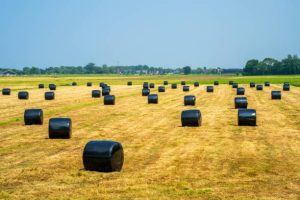When it comes to quality silage wrap is important. The quality of the plastic film you use will determine whether it will protect your bale from damage. A good quality plastic film will not include harsh ingredients, making your bale less likely to suffer damage. It will also help you preserve the freshness of your bale. This will ensure that it is ready for feeding animals.
Qualities of a good silage wrap
Good silage wraps have several important characteristics. First of all, they should be able to withstand different weather conditions. They should also be durable and offer air and water tightness. This will help prevent fermentation. Secondly, good wraps should offer UV protection.
 The material of a good silage wrap is also important. The integrity of the plastic is critical to preventing spoilage. In addition, the storage site should have good drainage and be weed-free. These characteristics will reduce the risk of rodent infestation. Lastly, a good silage wrap should be checked every two weeks to prevent leaks. Even a small hole can ruin a large bag of forage.
The material of a good silage wrap is also important. The integrity of the plastic is critical to preventing spoilage. In addition, the storage site should have good drainage and be weed-free. These characteristics will reduce the risk of rodent infestation. Lastly, a good silage wrap should be checked every two weeks to prevent leaks. Even a small hole can ruin a large bag of forage.
A good silage wrap should maintain a certain moisture level while keeping the silage cool. It should be tight to prevent oxygen from escaping and accelerating the ensiling process. It should also plug any holes that might develop in the wrap during the ensiling process. Finally, a good silage wrap should preserve the hay for at least 12 months.
The time it takes to produce a good bale of hay.
You must use a quality stretch wrap to get the best silage wrap. Quality stretch wrap will adhere to itself and hold the silage tightly. This type of wrap will be easy to apply, and the plastic will adhere to the bale as it is applied. The fermentation process takes approximately 28 days, and the final bale will be ready for use as feed.
The thickness of the plastic wrap is important as it prevents oxygen from escaping. A minimum of six to eight miles of plastic wrap is recommended. Wrapping a bale for 24 hours may lead to higher temperatures and lower feed quality. In addition, the thickness of the wrap is a key factor in preventing mould and spoilage.
There are two primary types of bales: individually wrapped and continuously wrapped. Individually wrapped bales are wrapped using multiple layers of stretched plastic film around the entire bale. Continuous wrapping uses the same stretching technique, but the bales are wrapped side by side. Proper site preparation is crucial before the wrapping process. Make sure the bales are placed on a level, non-abrasive floor.
UV protection
Quality silage wrap is made of materials with UV protection. Silage Wraps are made to withstand extreme climatic conditions, including tropical regions in Central and South America and harsh conditions in North America. These materials have undergone rigorous testing and are backed by a warranty against breakdown. This warranty is valid for a full year after the purchase date.
Whether hay is stored under cover or indoors, the plastic wrap should have UV protection. This will protect the feed from premature breakdown due to the effects of sunlight. To determine if the material you buy has UV protection, check its strength per unit weight. The stronger the film, the better.
Quality silage wrap has multiple layers of protection. More layers mean a more uniform thickness and fewer weak spots. Higher layer counts also offer better performance, ranging from puncture resistance to tear resistance. In addition, a high-quality film is more durable than cheap plastic wraps, preventing the bale from becoming damaged or deteriorating. As a result, it will last longer, and you’ll spend less time maintaining the film.
The Importance of Quality Silage Wrap
Quality silage wrap is essential to the protection and preservation of your hay. The plastic wrapped in the bales must be UV-stabilised to protect them from premature breakdown. Ensure that the wrap you choose meets all these requirements by checking the warranty period. It should also be waterproof and strong. For added security, choose a silage wrap that has a 12-month warranty.
Several factors determine the durability and quality of a silage wrap. One of the most important is permeability, as a poor seal means the silage will spoil before it is ready to use. The film should also have a good edge trim and be made from 100 per cent virgin raw materials. Silawrap is made in Gorey, Co. Wexford, Ireland, and is one of the toughest brands on the market.
A quality silage wrap will preserve the nutrition and moisture in the feed. Moreover, you’ll be able to sell excess bales without any problems. A quality silage wrap is a cost-effective way to produce hay. If you buy it from a reputable dealer, you can rest assured that the bales will be safe from damage or spoilage.